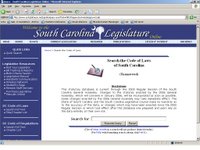
This article focuses primarily on legislative law such as code of laws or statutes and public law bills. Keep in mind that this is not legal advice of any kind. Please contact and work with a competent attorney for any legal matter. The following is just a general overview of the kinds of legal materials available online and in print forms. Usually, there are three kinds of laws that are generated by government:
1) Legislative - developed by local, state, and federal governments (sources such as code, public law or statutes). This is the main focus of this blog post today.
2) Judicial - developed by actual court cases from municipal, state, and federal courts (sources such as Case Law, US Supreme Court Reporter, South Eastern 2nd case reports, SC Supreme Court Decisions, Appellate Court Rulings, common law system rulings, etc).
3) Executive - sources such as the US Federal Register or the SC Regulations).
ORGANIZATION & PRESENTATION of CODE
Legislation that is passed by legislative bodies such as a town, city or county council; state legislative bod(ies) process; or congress and the possible consent of the president on the federal level are generally considered legislative law. Generally speaking public law is put into statutes or code to make it easier to research. Usually a governmental body will designate an official version of the code, case law, or set of regulations when more than one version exists the official version is the authority on the laws.
The code of laws, also known as revised statutes in some states, are a compilation of all public bills passed by a legislative body. Generally speaking the code of laws is built upon public laws passed over time and placed into a more user friendly format. The code of laws may come in various forms such as: non annotated (public law bills grouped by subject) or annotated (may include case law, attorney general opinions, historical footnotes, references to jurisdictions, and a variety of other kinds of information when available and applicable sometimes). The annotated version provides a greater amount of depth on a topic.
Note: Some codes may be searchable with full text and or are by title and section organization. A code of laws set may refer or defer to other jurisdictions as part of the law.
MUNICIPAL LEVEL
There are a variety of sources for municipal code such as Municode.com, American Legal Corporation or at local government websites code may be include. Some of the larger legal websites provide in many instances the official version of the village, city, or county level municipal code. Not all the cities, towns, or villages within Charleston County have municipal code on websites. These are just a few...
Folly Beach, City of
http://www.amlegal.com/follybeach_sc/
Kiawah Island, Town of (select ordinances on website)
http://www.kiawahisland.org/govt/conc.php
Mt Pleasant, Town of
http://www.amlegal.com/mtpleasant_sc
North Charleston, City of
Code on MuniCode.com
Seabrook, Town of
Code on town website
-- UPDATED Entry on 10/14/06 (SKS)--
Municipal code print versions, such as the Mount Pleasant Code of Ordinances are NO LONGER available at any Charleston County Public Library branches in print form.
STATE LEVEL LEGISLATION
The South Carolina House of Representatives maintains a website on the Code of Laws of South Carolina. Be aware of the disclaimer on the website and in print form noting the date of last update and that statutes enacted may not necessarily be updated on the website or in print form. Currently, the SC State House website also has a note that states "users rely on the data entirely at their own risk."
Currently, a person can search the SC Code by full text or use the title/chapter list option to retrieve results at the SC State House website found at: http://www.scstatehouse.net
We also have the print version of the South Carolina Code of Laws Annotated at the following branches: Cooper River, Dart, Dorchester, James Island, Johns Island, Main Library, Mount Pleasant, Otranto, Saint Andrews, and West Ashley branches currently.
FEDERAL LEVEL LEGISLATION
The United States Code is federal law enacted by Congress and the President. There are generally two forms of the federal code annotated and not annotated.
United States Code
Currently, a person can search by full text or use the title/chapter list option to retrieve results at the Office of the Law Revision Counsel website being:
http://uscode.house.gov It is searchable and down loadable.
United States Code Annotated
The print version at the Main Library is annotated and may contain additional legal information being: historical and statutory notes, cross references, library references, regulations, and notes of case decisions.



